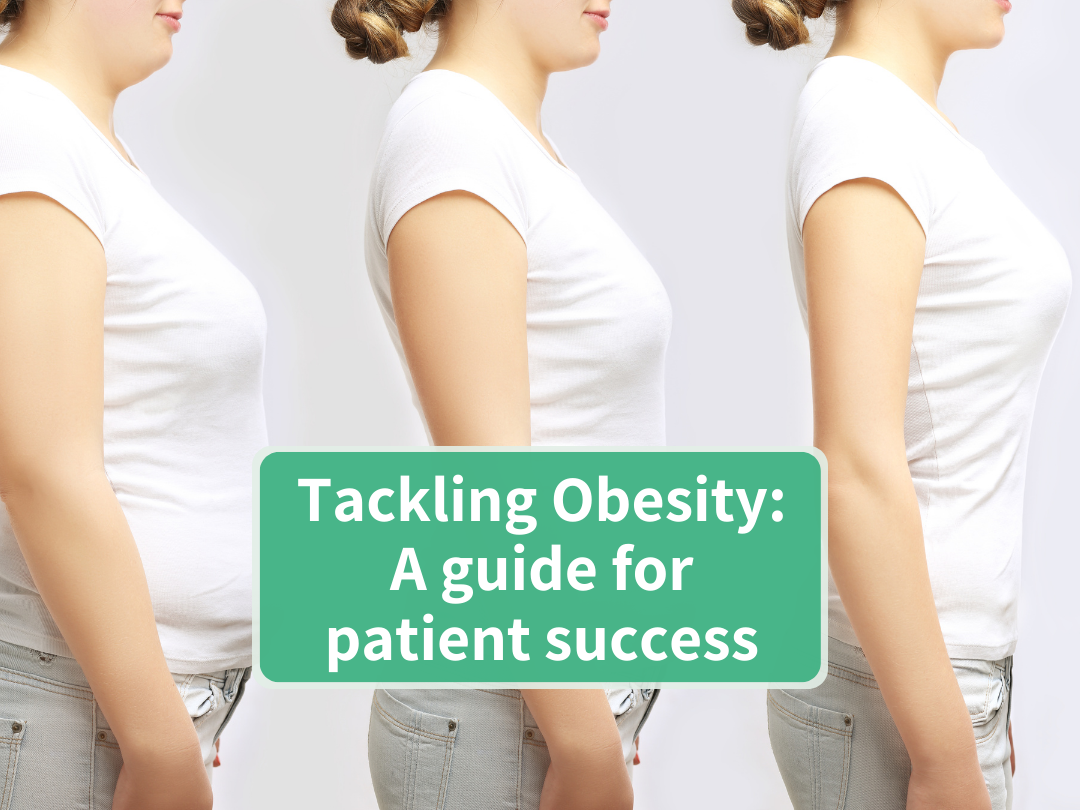
Easy Plant-Based Swaps
By Terri Chrisman (M.Nutr, Dip.ACLM) and Dr. Miriam Sonntag. Based on the original article by Dr. Paula Singmann, Niklas Oppenrieder (MD)
Science confirms that boosting plant intake promotes health. But how do we shift to a whole food, plant-based diet and make it stick? It’s easy if you do it gradually. Just begin right where you are. Do you already have some whole food, plant-based dishes amongst your favourite meals? Which simple swaps would turn your favourite dish into a whole-food, plant-based meal? Which simple plant-based recipes would you like to try out? Perfection isn’t necessary. Progress at your own pace, listen to your taste buds and customize the journey. Remember, lasting habits surpass conscious decisions.
Are you ready? Let’s embark on this plant-powered adventure together!
Use a pantry list
The best way to start your journey? Write down all the plant foods you already know and enjoy. Organise them into categories like fruit, vegetables, grains, legumes, nuts and seeds, herbs and spices. Do you like bananas? Or apples? Maybe you love broccoli. Don’t judge. Simply jot it down.
Next, look at your list for spaces. Do you have lots of fruit, but hardly any vegetables on your list? Is your legume list looking sad and lonely? Never fear, we will fill it up in no time.
To make your shift simple and easy, we have prepared a pantry list below. To set up your fridge and pantry for success, compare your list with the PAN-approved staples. Choose a few items from each category that you might like to try. Add them to your shopping list. Having the food you need on hand helps you to stay on track.
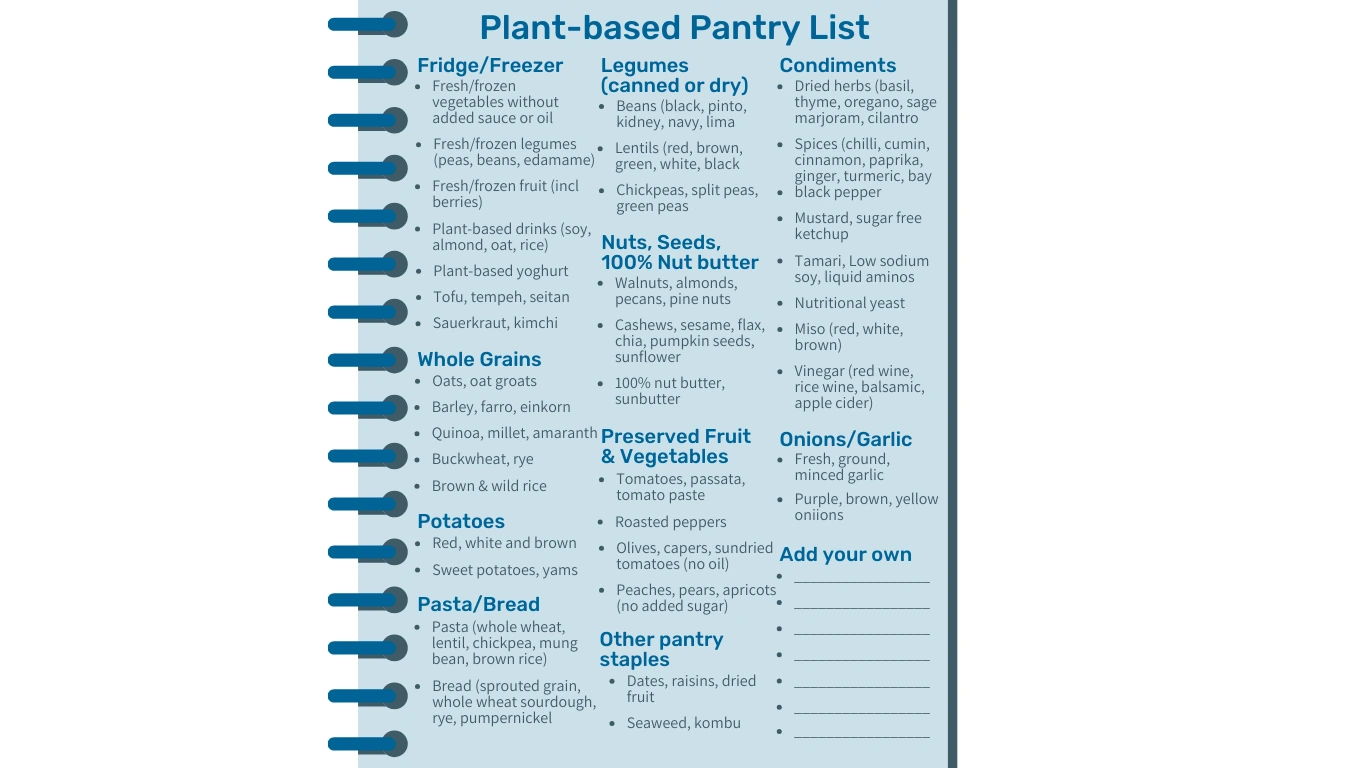
Focus on easy swaps
Now, start by eating your favourite plant-based dish more often. Then take a family recipe and try to “plantify” it. Just swap out unhealthy ingredients for nourishing plant-based alternatives. For example, in meat-based dishes, lentils or tofu are excellent swaps. Don’t worry, take it one step at a time. Start with single swaps and gradually incorporate more over time.
Once you have mastered your favourite recipes, explore the internet for new and exciting whole food, plant-based recipes to try, or buy a whole food, plant-based cookbook. Pay attention to ingredients and make sure that the recipes do not contain ultra-processed plant-based foods. You probably won’t love everything you make, but you might just discover some new favourites to replace some old ones. Begin with one plant-based meal a day, then progress to two.
Breakfast is usually the easiest. If you start your day with muesli, replace dairy milk with plant-based drinks. If you want to take it one step further, swap boxed cereals for whole-grain rolled oats. To add some flavour, add fresh fruit, nuts, seeds and spices like cinnamon.
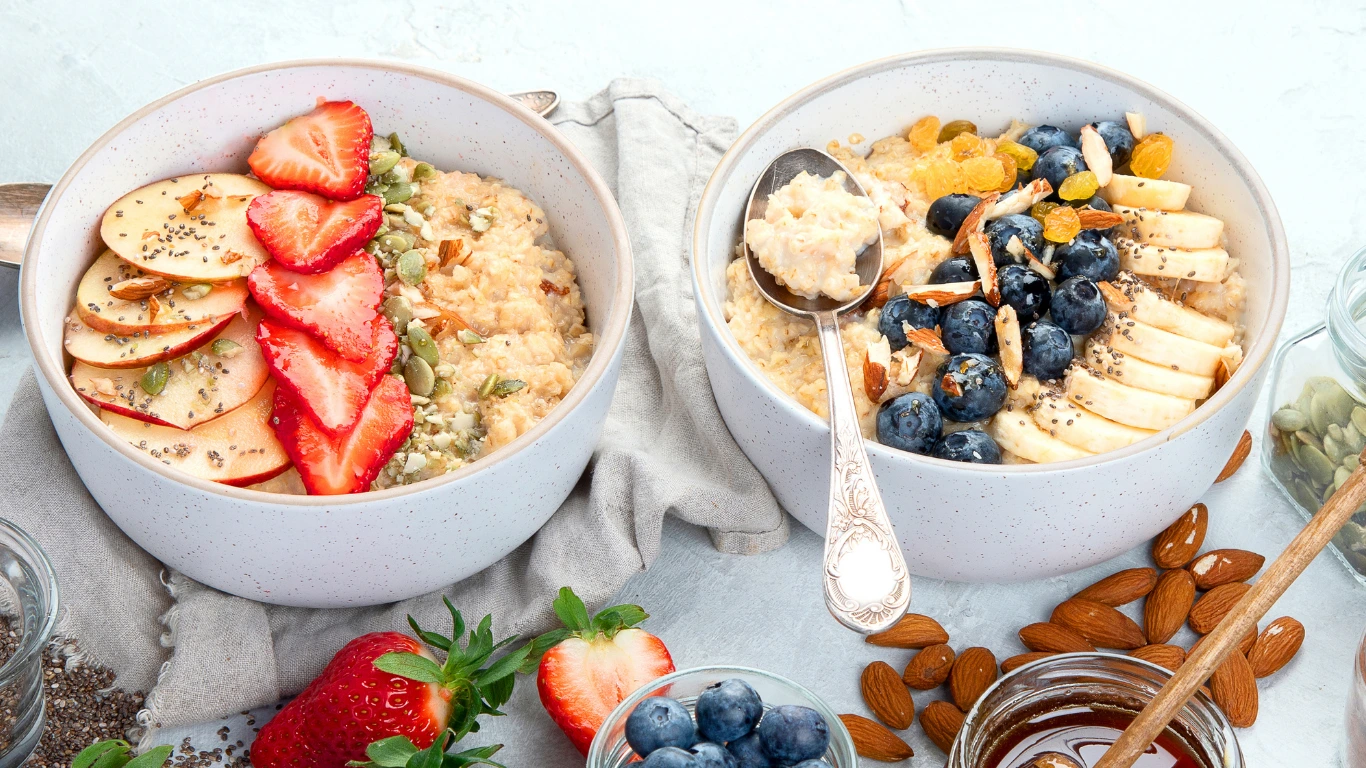
Plant-based cooking does not need to be complicated. To make a quick nutritious meal, simply choose some vegetables, whole grains, and a plant-based protein source like legumes. Add tomato salsa or avocado, some herbs and spices, maybe some nuts and seeds, and enjoy! A recipe is not required. Focus on the foods you add, not the ones you remove. It will ease the transition and make it easier to stick to. Let’s uncover some easy swaps for any recipe.
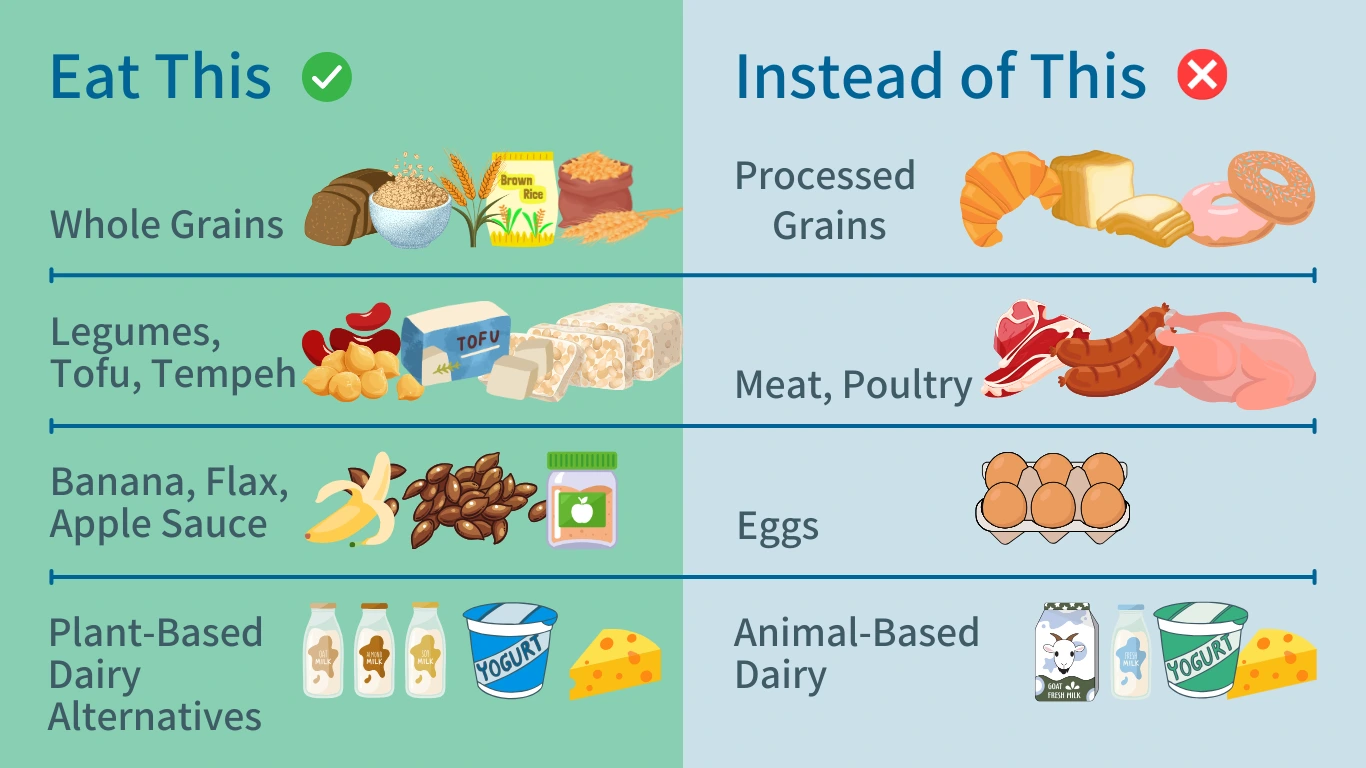
Grain swaps
Meat swaps
When you first try a plant-based diet, it can be daunting to swap out a complete food group from your plate. Yet, you only need to shift your perception of what makes a meal. Try our swaps, and discover that very soon, you won’t miss meat at all.
Start with recipes where meat only plays a supporting role. Replace it with plant-based alternatives like tofu, seitan, lentils or tempeh. Pick the plant protein that provides a similar texture. You’ll find out that the taste is all in the seasoning, not the meat.
For more inspiration, try our recipes below:
- Spaghetti Bolognese – Swap out the meat for lentils.
- Tacos – It’s not the meat that makes tacos so delicious. It’s the spices! Make a filling from beans and veggies and use lots of Mexican-inspired herbs and spices.
- Bacon flavour? Get that smokey flavour by using a marinade. You can marinate almost everything such as mushrooms, tempeh, tofu, or aubergines. Try equal parts low-sodium soy sauce or tamari, low-sodium vegetable stock, maple syrup and water. Spice it up with a few drops of liquid smoke (optional), smoked paprika, onion powder and garlic powder. Marinate for as long as you like – overnight is great. It’s delicious!
Baking swaps
Want to level up your plant-based baking skills? Then try out a whole food, plant-based cake. All you need to do is swap the flour, butter, eggs, sugar, and milk for more healthful ingredients. Sounds impossible? It’s easier than you might think. Simply use our handy table below.
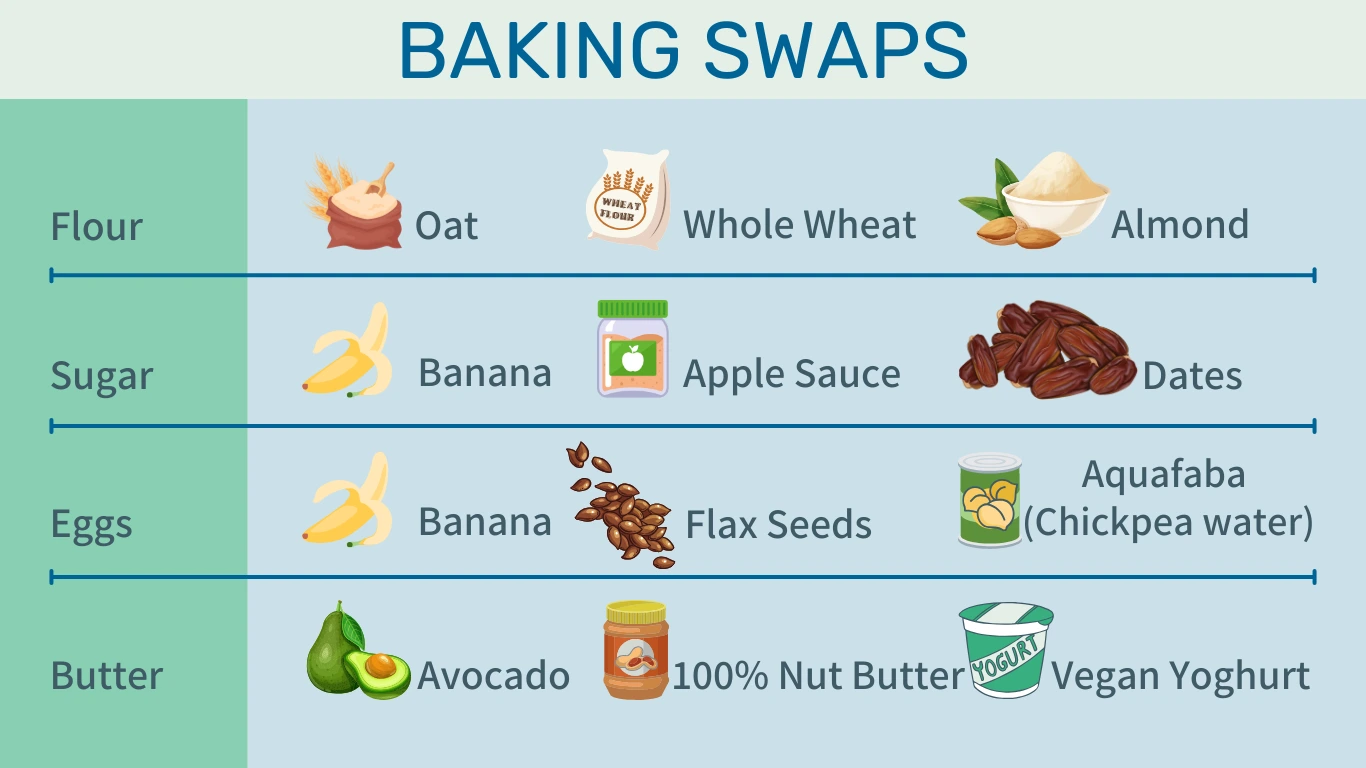
You will soon find that baking is part art and part science. This table is not an exhaustive list of all baking situations. With a little research, you will find many more baking swaps online. Try them out and let us know which ones are your favourites.
Take-home message
Transitioning to a whole food, plant-based diet needs a bit of planning. But that’s the case for all diets. With our easy swaps, the switch should be a breeze. Enjoy the journey and listen to your body. Do what works for you. Remember, it’s about lasting changes, not perfection.
Practical tips to transition to a plant-based lifestyle
- Start with what you already like and take it from there
- Focus on what you add to your diet, not what you take away
- Pay attention to how foods make you feel. You may notice more energy eating more plants
- “Plantify” your family’s favourites first
- Use the internet to find plant-based versions of all your favourite recipes and adapt them to your taste
- Be brave and try new things. It doesn’t matter if it doesn’t work out the first time
Quiz questions
Want to check if you remember the essentials of this article? Then test how much information you retained with this quick quiz!
Good luck!
Further information
For more information on the benefits of a plant-based lifestyle, join the PAN Academy.

Making better physicians
Ready to improve your nutrition knowledge?
Sign up for the PAN Academy and take our free online courses on nutrition science.
Mini Modules on Diet-Related Diseases
This series of short modules addresses common diet-related diseases such as heart disease, hypertension and type 2 diabetes. Learn the causes and which patients are at risk, and find out practical solutions to managing these diseases through whole food, plant-based eating.



Making better physicians
Ready to improve your nutrition knowledge?
Sign up to the PAN Academy and take our free online courses on nutrition science.
Mini Modules on Diet-Related Diseases
This series of short modules addresses common diet-related diseases such as heart disease, hypertension and type 2 diabetes. Learn the causes and which patients are at risk, and find out practical solutions to managing these diseases through whole food, plant-based eating.
References List:
- Aune D, et al., 2016. Whole grain consumption and risk of cardiovascular disease, cancer, and all cause and cause specific mortality: systematic review and dose-response meta-analysis of prospective studies. Available from: https://www.bmj.com/content/353/bmj.i2716


Author
Terri Chrisman M.Nutr, Dip.ACLM
Terri Chrisman M.Nutr, Dip.ACLM is a Medical Content Creator at PAN and part of the online education team responsible for the PAN Academy. She is an Australian citizen living in the USA who has travelled and lived all around the world. She is a qualified nutritionist and certified in lifestyle medicine, and is vastly experienced in creating educational content on the topics of nutrition, health and sports.


Author
Dr. Miriam Sonntag
Dr Miriam Sonntag is the Medical Content Executive of the online learning platform, PAN Academy. Having worked in basic research, she knows how to decipher complex information. Working now at PAN, she scans and pours over scientific papers and books. She breaks down the latest nutritional research into actionable advice for everyday life. She is committed to sharing the bigger picture of why it is good to put more plants on your plate.
Recent posts
Alzheimer’s Disease: Decode the Complex Puzzle
Alzheimer’s is a complex puzzle. Learn about genetic factors and how recommending a whole food, plant-based diet can elevate patient care.
A Patient Guide to Outsmarting Alzheimer’s Disease
Learn how dietary choices impact Alzheimer’s risk. Discover measures that can slow progression and reduce its effects.
Manage Your Rheumatoid Arthritis With Diet
Manage rheumatoid arthritis naturally with a plant-based diet. Reduce inflammation, ease joint pain, and improve your overall health.
Rheumatoid Arthritis and Diet: A Physician’s Guide
Rheumatoid Arthritis and Diet: A Physician’s GuideBy Carlijn Wagenaar, MD and Wendy Walrabenstein, RD from PAN The...
Heart Disease: A Patient Guide to Prevention and Reversal
Discover how to prevent and reverse heart disease. Learn about the advantages of lifestyle changes with a whole food plant-based diet.
Heart Disease Uncovered: A Physician’s Guide
Uncover the secrets to prevent and reverse heart disease. Learn how a whole food plant-based diet can help patients lead a heart-healthy life.
Treating the Silent Killer: Hypertension Insights and Solutions
Explore the power of plant-based diets in managing hypertension. Empower your patients to take control of their blood pressure readings.
Hypertension: A Patient Guide to Reducing High Blood Pressure
Is high blood pressure dangerous? What can you do to manage hypertension and reduce your risk of other related diseases?
Carbohydrates: A Complex or Simple Matter?
Are carbohydrates essential for our health? Do low-carb diets yield greater weight loss? What benefits do whole plant-based foods provide? Find out the answers to these questions and more in this blog post.
Tackling Obesity: A Guide For Patient Success
Discover a proven method to overcome the shackles of obesity. Lose weight and regain your zest for life with this simple strategy.










